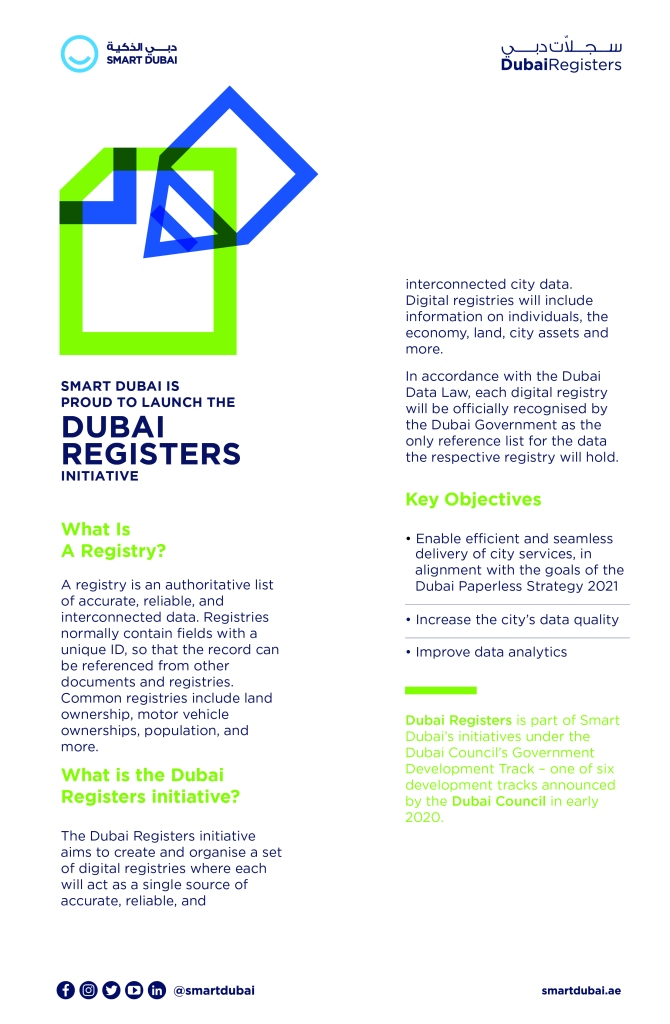
Smart Dubai has launched the ‘Dubai Registers’ initiative to build a network of accurate, reliable, and interconnected data registries for a sustainable and happy city. The project is part of the Government Development track – one of six development tracks announced by the Dubai Council in early 2020.
The initiative’s approach is to collect, organise, link and store the latest and most accurate data for the most important aspects of Dubai life – the Emirate’s people, its economy, land and other assets. The purpose of creating these digital registries is to ensure that Dubai’s data is useful to as many as possible.
Data organised in this way can be used to ensure more efficient and higher quality interactions between the government and its citizens, residents, and visitors.
The initiative sets out a clear roadmap for 2020 and 2021 for the prioritisation and preparation of registries in general, along with the supporting standards and advanced governance procedures to ensure safe and responsible use of data. The project will make use of reliable data available on the Dubai Pulse platform to identify potential registries.
Her Excellency Dr Aisha Bint Butti Bin Bishr, Director General of Smart Dubai, said: “Dubai has led a steadfast and illustrious journey towards harnessing the power of data and building a robust infrastructure that puts data at the heart of future smart-city plans. Following the vision and directives of our wise leadership, and as the government entity tasked with spearheading Dubai’s smart transformation, Smart Dubai has rolled out a whole portfolio of initiatives and services built around harnessing the power of data.”
“And today, we celebrate yet another addition to these initiatives,” H.E. Dr Aisha added. “Dubai Registers marks a ground-breaking new milestone in our journey; it allows us to begin utilising the vast amounts of data we have accumulated through other initiatives, and classify and present them in the manner most accessible and useful to our various partners and the residents and visitors of Dubai. The project also allows government entities to use Dubai Registers to accelerate the pace of achieving the Dubai Paperless Strategy’s objectives, which aims to digitise all internal and external government to individuals transactions, making them fully paperless by December 2021.”
His Excellency Younus Al Nasser, Assistant Director General of Smart Dubai and CEO of the Dubai Data Establishment, the establishment leading Smart Dubai’s data efforts, noted: “Dubai Registers will be the only officially recognized collection of registries with details on all important aspects of life in the Emirate of Dubai. This makes data ideally positioned to support the process of developing government services, improving all aspects of people’s lives, and spreading happiness among them. The Registers also support the process of integrating data, and linking it with the various aspects of life in Dubai.”
“With the Dubai Registers initiative, Smart Dubai seeks to enhance the quality of data available, all the while enabling efficient and smooth government services for the community,” H.E. Al Nasser added. “Smart Dubai is also looking to launch new use cases in data science and analysis that will rely on Dubai Registers to support smart decision-making with accurate, reliable, and interconnected data.”
“Dubai Registers will also allow us to regulate the collection, use, and exchange of data and optimise its use,” H.E. explained. “The initiative has been compared with examples from other countries that have implemented such a system, and their experiences have been used to develop the project to suit the requirements and needs of the city of Dubai.”
According to the Dubai Data Law, these registries will be identified, organised, and categorised, in addition to identifying the entities responsible for each of them. They will be used as a single and reliable source to provide information to others – one that is recognised as a reference by Smart Dubai, as per the Dubai Data Law.